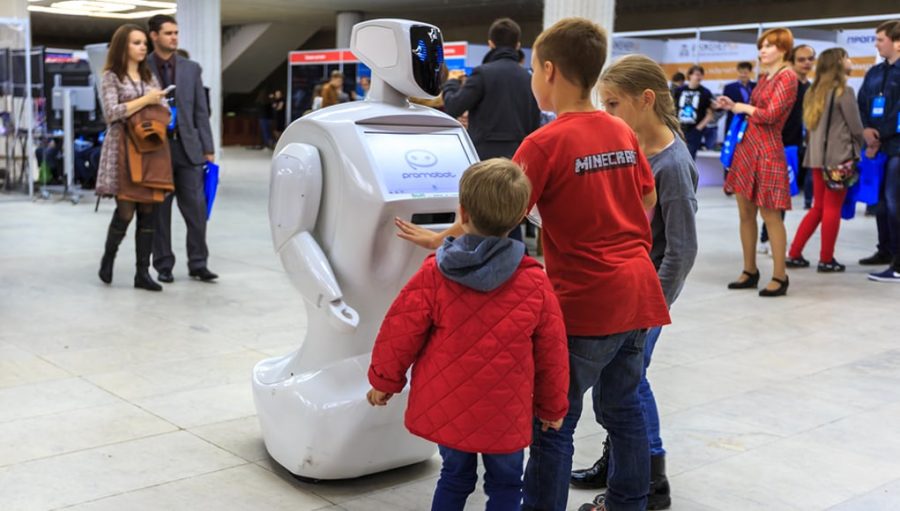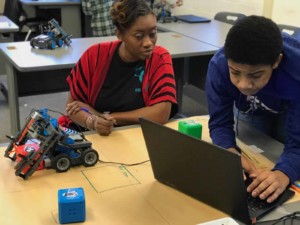Learning Applications
Curriculum, Instruction & Assessment will be some of the core categories shaped by artificial intelligence and automation. In fact, some of this is already happening today.


Online & Blended Learner Experience Design & Facilitation
As AI adapts to the changes in the landscape impacting what the learning experience is for students, it will naturally impact the teacher’s learning experience design work as well. Platforms will offer real-time and longitudinal feedback on levels of student engagement, notice when classroom assignments did not sufficiently address standards or learning targets, the teacher’s performance in designing and delivering instructional activities, recommending related content, and eventually support teachers to choose and adapt content to better respond to students’ interests, desires, needs, and community assets.
At St. Vrain School District, education leaders are integrating new forms of professional learning to rapidly learn nd implement AI. They are calling it Exploration AI and it encompasses:
- Self-Directed, Gamified Learning: Throughout the year, educators in St. Vrain Valley Schools engage in an AI-centric Bingo game. This encourages them to experiment with a range of AI tools in scenarios like designing a weekend getaway, formulating a personal workout regimen, or crafting innovative formative assessment strategies aligned with student learning outcomes.
- EdCamp Pop-Ups: Diverging from conventional professional development paradigms, our educators can participate in monthly sessions that emphasize collaborative dialogue and shared learning, demonstrations, and hands-on experimentation designed to enhance their pedagogical tactics and their understanding of AI’s myriad applications.
- School Champions: Each school will identify an “Exploration AI” champion, who will collaborate with the school’s leadership team to interweave AI strategies into their site-based monthly late-start professional development days. These champions, likely AI pioneers themselves, will invigorate and inspire the broader school community with their passion and knowledge.
Examples of technology solutions:
- Cognii: Personalized learning models through AI
- FACT: AI orchestration system
- Mursion: Orchestration and performance monitor
- Edthena AI Coach: a virtual assistant to monitor teaching and provide suggestions and feedback about improvement opportunities
- Osmo: Altering learning experiences
- Packback: Automated moderation of discussions
- Nolej: ai curriculum creation
- Waggle: AI co-pilot for management and team improvement
Bodo Hoenen on Generative AI for Curriculum (Nolej)
Bodo Hoenen and his company Nolej are doing impressive work to help create a generative AI engine to create engaging and modular content in minutes from a document.
Edthena AI Coach
Edthena has launched an AI coaching tool that provides real-time facilitation feedback, identifies trends and makes improvement recommendations for your teaching practice.
Adaptive & Augmented Learning Experiences
Adaptive learning solutions have been assisting with differentiated instruction for educators by enabling them to personalize instruction. When used well, this technology can result in a curriculum that is flexible enough to meet the needs of each student no matter where they are in their learning journey. In fact, tools like Knomadix view themselves as an “operating system” rather than an add-on. This approach makes it easier for students to interact as it removes pressure from prompting. Instead, the AI is automatically responsive and adaptive, resulting in higher-quality learning.
The way this software functions is most familiar to educators who have employed a diagnostic tool for all their students such as the NWEA MAP assessment suite or a credit-recovery program from a vendor such as Edmentum. With constraints defined by input from the program administrators, these tools employ, “…[c]ommon machine learning techniques include decision trees, support vector machines, and ensemble methods,” as defined by MathWorks.com. Increasingly challenging items are placed before the student until the edge of their learning is discovered and then items or activities nudge growth from this point forward.
In a recent Getting Smart blog by Jeremy Roschelle & Pati Ruiz, the authors shared that “Another example, from [the] Center for Integrative Research in Computing and Learning Sciences (CIRCLS) research hub, is a National Science Foundation-funded project that is using AI technologies to develop new accessibility tools to enhance programming experiences for people with blindness or visual impairments (BVI). Teaching programming and data science skills to students with BVI is challenging without AI tools, due to the limited capabilities of current screen readers to properly read code. There are often complications when using screen readers to navigate lines of code to locate the desired line when programming. The success of this project will improve the adaptivity of teaching computer programming and data science to students with BVI and may improve access to career opportunities.”
Examples
Adaptive Whole Curricula
- Carnegie Learning: a comprehensive curriculum using adaptive technologies to inform their “Adaptive Personalized Learning Score” to measure a student’s growth over time.
- DreamBox: Using adaptive software, “DreamBox provides differentiated math instruction to students while simultaneously providing educators with powerful insights and data.”
- ALEKS: “ALEKS is a research-based, online learning program that offers course products for Math, Chemistry, Statistics”
- i-Ready: “i‑Ready is a comprehensive assessment and instruction program that empowers educators with the resources they need to help all students succeed.”
- iStation: A blended/adaptive curriculum for reading, math, and Spanish, from intervention to enrichment.
- Playlab: From project generation to personalized IEPs, Playlab is a great way to build a chatbot across your tech stack.
Adaptive Platforms
- RealizeIt: “Realizeit creates engaging experiences that connect the knowledge a learner needs with the content necessary to learn.”
- Fishtree: “Fishtree automates resource generation, automatically aligns content to learning objectives or competencies and adapts to the learning profile and knowledge gaps of every learner with one click.”
- Area9Lyceum: combines adaptive pathways with project-based learning
Patricia Scanlon on Soapbox Labs and Voice Technologies
In this clip from a Getting Smart Podcast, Dr. Patricia Scanlon of Soapbox Labs explores the progress, the use cases and the challenges of voice recognition technologies.
Examples
Smart Tutors
- Riiid: “making 1:1 education for everyone possible through their AI tutor to help every learner find an optimal learning path and unlock their full potential.”
- Socratic: “This learning app, powered by Google AI, helps you understand your school work at a high school and university level.”
- Khanmigo: Khan Academy’s AI-powered learning guide. This tool serves as both a tutor for learners and an assistant for teachers.
Adaptive Language Arts Tools
- Amira (k-8): “the first intelligent reading assistant that listens, assesses & tutors. Amira accelerates reading mastery.”
- Liulishuo: “is an artificial intelligence (AI) company in China that creates and delivers products and services to popularize English learning. Its proprietary AI teacher utilizes cutting-edge deep learning and adaptive learning technologies, big data, well-established education pedagogies and the mobile internet.”
- Microsoft Immersive Reader: “Immersive Reader is a free tool that uses proven techniques to improve reading for people regardless of their age or ability.”
- Newsela: “Building a future where vibrant digital reading experiences supercharge reading engagement and learning in every subject.”
- NoRedInk: “Builds stronger writers through interest-based curriculum, adaptive exercises, and actionable data.”
- Turnitin: plagiarism and AI detection tools
- Pressto: teach learners in grades 3-8 to write through journalism.
Adaptive STEM Tools
- Assistments:” Enhancing math curricula with actionable data for teachers and immediate feedback for students.”
- Querium: “Querium helps students master critical STEM skills, preparing them for college and beyond. Our platform delivers personalized, bite-sized lessons with expert, step-by-step tutoring assistance that motivates students to succeed.”
- Numerade: Provides a rich interface for getting step-by-step assistance to problems in textbooks or online.

